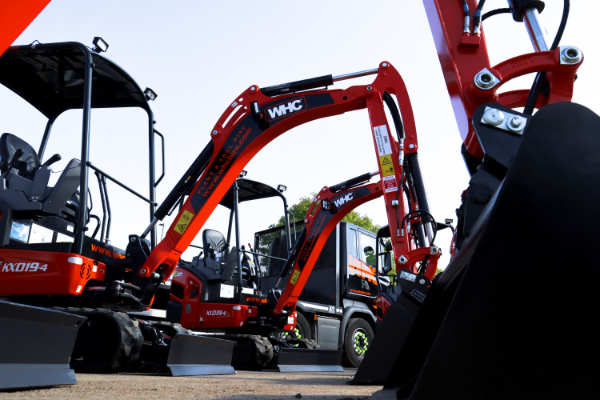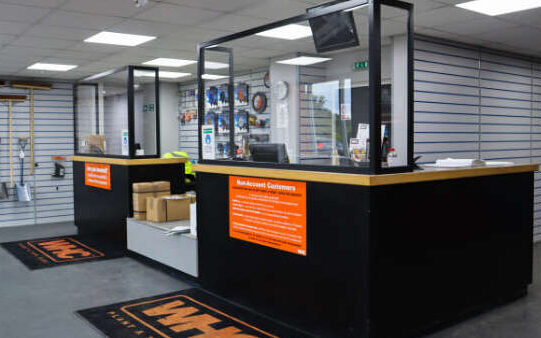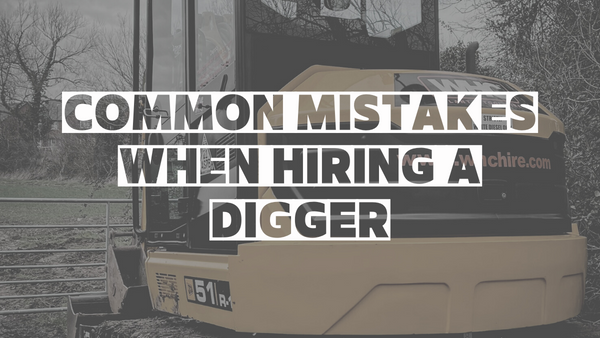The Most Common Mistakes When Hiring A Digger.
When preparing to undertake any type of project that may require an excavator, then like most people, you won’t want to make any mistakes. An excavator is an integral piece of modern-day construction that holds a large responsibility. With this large responsibility comes a sizable price tag to purchase one outright. Hence, it is more common for people to hire their diggers, rather than risk the financial investment. We have been supplying excavators to businesses of all sizes throughout the UK for over 25 years. With all this experience, we have witnessed several common mistakes made when hiring a digger. That’s why we have put together this exclusive resource to help set the record straight.

Inadequate machinery
When choosing a digger, it is important that you get the correct size machine for the job. First, you need to ensure that your machine will have the required lifting capacity and reach for the task at hand. Examples of tasks are such as digging, trenching, lifting, construction, clearance, demolition, dredging, grading and more.
Choosing to hire the incorrect-sized machinery can lead to delays and further charges for the excavator hire. Commonly, businesses will try to make cuts on the hire cost of machinery by trying to opt for a smaller option. This inevitably leads to machinery being returned, followed by a large machine being dispatched thereafter. On the surface, this scenario doesn’t seem all that of an issue. However, once you take into account the added transport costs, cleaning and fuel used by the machine you return. Suddenly, choosing inadequate machinery can become a very costly mistake.
Mistakes like this when hiring a digger are extremely common but are easily avoided. If you are ever unsure, ask your supplier for assistance in choosing the right size machine for your project. Remember, choosing a machine that can complete all of your earthmoving and lifting work safely throughout will save you money in the long run. Check out our guide to hiring a digger here.
Site access issues
The next common mistake that we come across when hiring a digger is access issues. You’re probably going to think that after reading about inadequate machinery, you might want to grab the largest machine you can find. But, sadly, it is slightly more complicated than this.
It is extremely common that machinery can be ordered to site, only to be recalled because clients have not done their homework. By this, we mean fully assessing the access and exit points of the area they are working on.
Common obstacles that you may encounter are buildings, walls, doorways, fences, ground pressure, stairs, hills, road access, bridges, etc. By conducting a full assessment of the site access and of the dimensions of the equipment you are looking to hire, you can completely avoid this mistake from happening.
Below is an example of the information you need to hand when choosing a digger to hire. You can find this information on most plant hire supplier websites. If in doubt, ask your supplier for the machine’s make and model, as most product specifications are easily found on the internet.

Modern diggers have been manufactured in several designs to bring a blend of power, reach and size together. If you require a machine like this, we would highly recommend you take a look at RTS (reduced tail swing) and ZTS (zero tail swing) diggers if this is the case. For more information about these machines, see this additional resource from our vault “Conventional vs reduced tail swing excavators”
Driver Qualifications
Now that you have assessed the required machine size, and access and exit points of your project site, the next common mistake is having sufficient qualifications to operate the machinery. No matter how long or how experienced you may be at operating a digger, for commercial use, having an accredited NPORS/CSCS operator’s licence for an excavator is essential. And, if you are looking to grow your business in this sector, you are going to be expected to produce your licences when working on large building sites.
Driver qualifications are something that will also be expected as part of your business and liability insurance. If you don’t have the required qualifications, don’t panic. Providing you work well in advance, finding an operator to help you, shouldn’t be too much of a challenge. Hiring an operator is a great place to start. However, you can expect wages of £18+ per hour for a skilled excavator driver.
If your goals are to involve earthmoving regularly within your operations, then investing in NPORS training will be extremely beneficial.
Track types
The next mistake we come across when hiring a digger is the type of machine tracks used. This issue once again comes down to planning, just like the access mistakes. However, this mistake is slightly different. There are commonly three main types of excavators: rubber-tracked, steel tracked and wheeled. Ensuring that your excavator has the correct type of tracks is essential to the way your machine operates. Small mistakes like this can be extremely costly, not only to exchange the machinery but to repair damages.
Steel tracks will damage soil ground surfaces like concrete, asphalt and grass areas. As you will notice, most large excavators operate on steel tracks. Therefore, how can you avoid causing large amounts of ground disruption or damage with a steel-tracked digger? One option is to opt for a wheel excavator. However, these machines are generally only designed for road operations. Standard rubber-tracked excavator sizes are limited when it comes to hiring a digger. Your next best option is to opt for rubber pads to be installed onto the steel-tracked excavator. Options like this can be installed on your machinery before it arrives.
In doing so, you will be able to bring larger machinery to your project, providing the access that allows you to do so. For more information about rubber pads on diggers to hire, check out this additional resource from our vault. “Rubber Pads For A Steel Tracked Excavator – Uncovered”
Insurance
Another common mistake we have experienced revolves around the insurance of the digger when it is taken out on hire. It is imperative that you have some type of insurance to cover the cost of the machinery when it is in your possession. When signing an agreement to hire machinery from a supplier, you must understand that you are 100% responsible for the equipment during that time. A result of damage, theft or loss of machinery during a hire period is invoiced directly to the client. Therefore, if you do not have an insurance policy that covers you for hired-in-plant equipment, you could be stuck with a bill that could cause you to go bust.
Diggers can cost anywhere between £15,000-£150,000+ to replace. So, insuring your equipment for a small period you have it is a tiny investment to protect yourself. You will be surprised how many people risk the option and end up wishing they hadn’t.
Most public liability insurances for businesses will have the option to add “hired in plant” to their policies, which is easily done prior to receiving your equipment. Alternatively, a temporary policy can be set up with a third-party company for the duration of your hire. For more in-depth information about plant hire insurance, including some recommendations check out, “Plant hire insurance (hired in) explained)”.
Quality of equipment
The last of the common mistakes when hiring a digger is whom to get your digger from. The quality of the equipment you choose to hire. This choice has a huge impact on your productivity levels. Hire equipment, unlike purchased equipment, goes through a huge amount of hours by a large array of experienced operators. Resulting in a machine that has minimal downtime throughout the whole year.
Choosing to pair with a plant hire company that regularly updates its equipment will avoid any avoidable machine issues to occur. We have already mentioned that cost is a massive factor when it comes to hiring adequate machinery. The same applies to your supplier. If you choose to hire cheap, you run the risk of the machinery being defective at some point. When scanning the internet to find a prospect to hire try to avoid the cheapest option. Pay your prospects a visit, see their equipment, and get a feel for the age of the equipment and the quality of maintenance and service. Remember, the equipment you choose to hire will have a direct effect on your profit margins and your levels of productivity.
Where to avoid mistakes when hiring a digger?

WHC Hire Services in Gloucestershire has been helping businesses and DIYers avoid mistakes when hiring a digger for over 25 years. Built on a wealth of experience and knowledge from working with our local and national clients, our high-performance, low-hours fleet is designed to be the most productive of its kind in the UK. With a huge range of hand-selected, advanced plant equipment, we are able to help you get the job done every time.
Speak to our teams by calling 01684377977 to discuss your digger hire requirements today. Check out our online catalogue of equipment or pay your local depot a visit to see our equipment for yourself.

